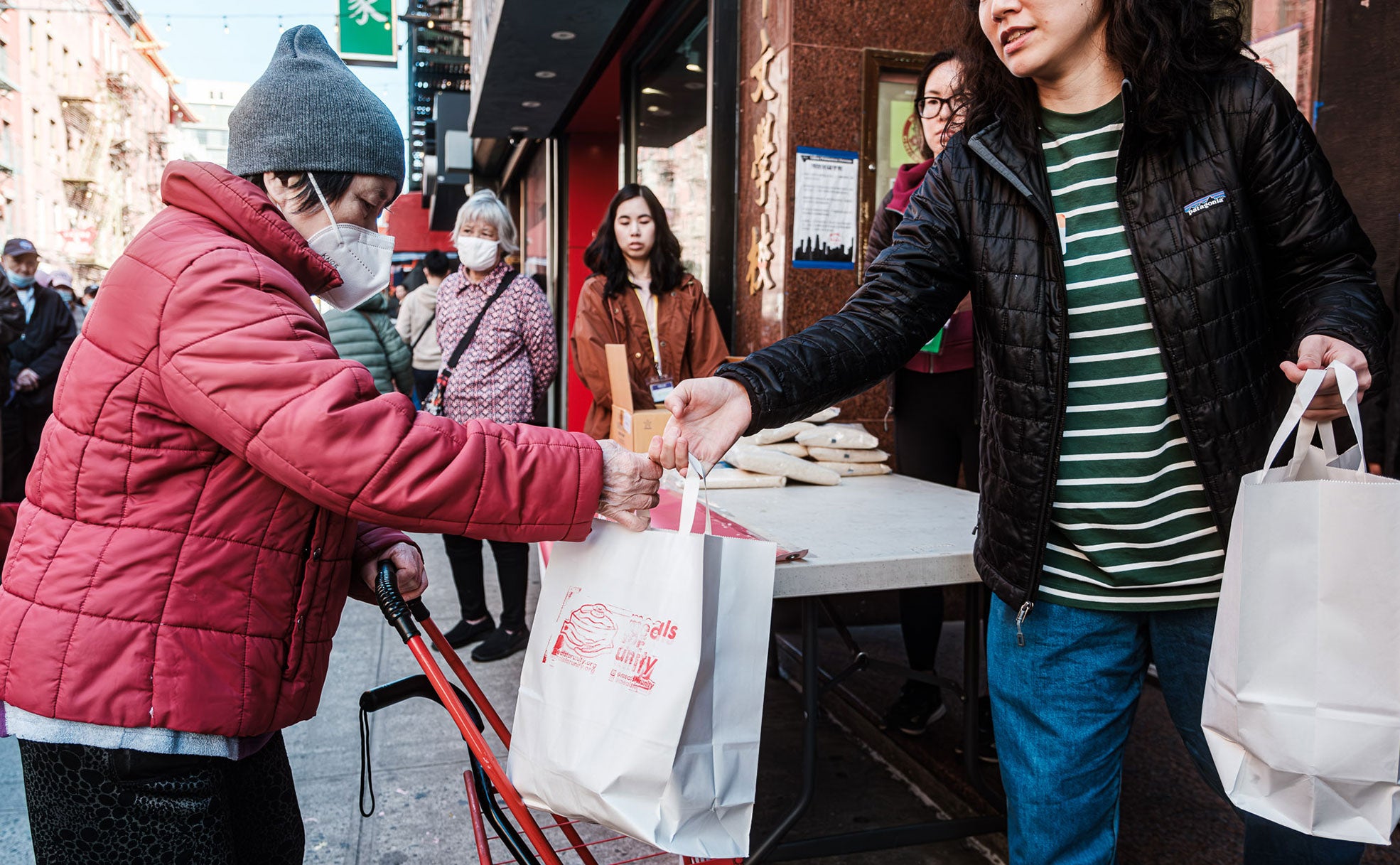
Meals for Unity, From One-Time Event to a Movement
In 2020, when we were all learning how to adjust to the pandemic, we also saw an uptick in violence committed against the AAPI community. The Asian elderly were especially targeted and impacted. It moved Brian Pham to mobilize his circle of friends to cook and prepare meals for the AAPI elderly community facing food insecurity in Manhattan Chinatown. Word spread and additional volunteers helped to serve over 300 meals in that first event.
What was meant to be a one-time event evolved into Meals for Unity, a full-fledged nonprofit organization. Meals for Unity addresses the surge in social disparities of violence, poverty and food insecurity in the AAPI community in NYC. We are thrilled for how far Meals for Unity has come and the contributions it has made to our community and are excited for Meals for Unity to be our cause partner this quarter.
We caught up with Founder Brian Pham and Executive Director Priscilla Cheng to learn about how they grew Meals for Unity into a movement and about the AAPI communities that they serve across the NYC boroughs.
Tell us who you are and what you were doing prior to founding Meals for Unity? How did you get together to form your initial founding team?
BRIAN: I'm Brian. And I’m actually from Texas. I moved to New York on a job doing audit work at one of the big four accounting firms, and currently still in corporate doing my full time gig.
PRISCILLA: I'm Priscilla Cheng, and I am an Executive Director for Meals For Unity. And we both do this as volunteer work. I work in marketing as my day to day job.
BRIAN: So the background of Meals for Unity, it was kind of wild. I did not expect it to unfold as it has. But, you know, we were in the pandemic. And there was a lot of API hate going around, especially towards the Asian elderly community. And my old roommate, who's actually one of the founding members sent me a video of this Asian woman walking down the street, and she got knocked over and beat up in front of an apartment complex. And that doorman kind of closed the door and turned a blind eye. And that happened at 360 West 43rd. I happened to live at 350 West 43rd. So although I knew this was happening in the city, just something about it happening like right next door in your own backyard made me feel like I needed to do something. So I asked one of my friends who's really involved in DNI initiatives, etc. And she was saying, Hey, you like to cook? Why don't you find a local community center and ask for donations from your friends and family and cook some meals for the elderly? So we kind of did just that; it was like a blur of one and a half weeks, but I put out a call on my Instagram, and I was really only going to do 100 meals. It was really overwhelming. We were really scrappy. I got together all the friends that I could who wanted to do it. And we made 150 meals in my small New York City apartment, and we got a local chef to help us cook another 150 meals. And we brought that to the community center and handed out these meals, and they all went in like 30 minutes, it was really crazy.
And there were still people coming up afterwards. And we didn't have anything to give. And that feeling is really not a great one and we're like, obviously, there's a need here. So why don't we continue doing this? And when I do something, I'm not gonna half-ass it. So for the next month, we incorporated into 501(c)(3), and put out a call on our Instagram. There were three of us. And we brought on four more people who really wanted to get involved. We had a founding seventh who took us into our first year of meals, doing this meal event every week where we get up at like 3am and cook the meals and distribute them.
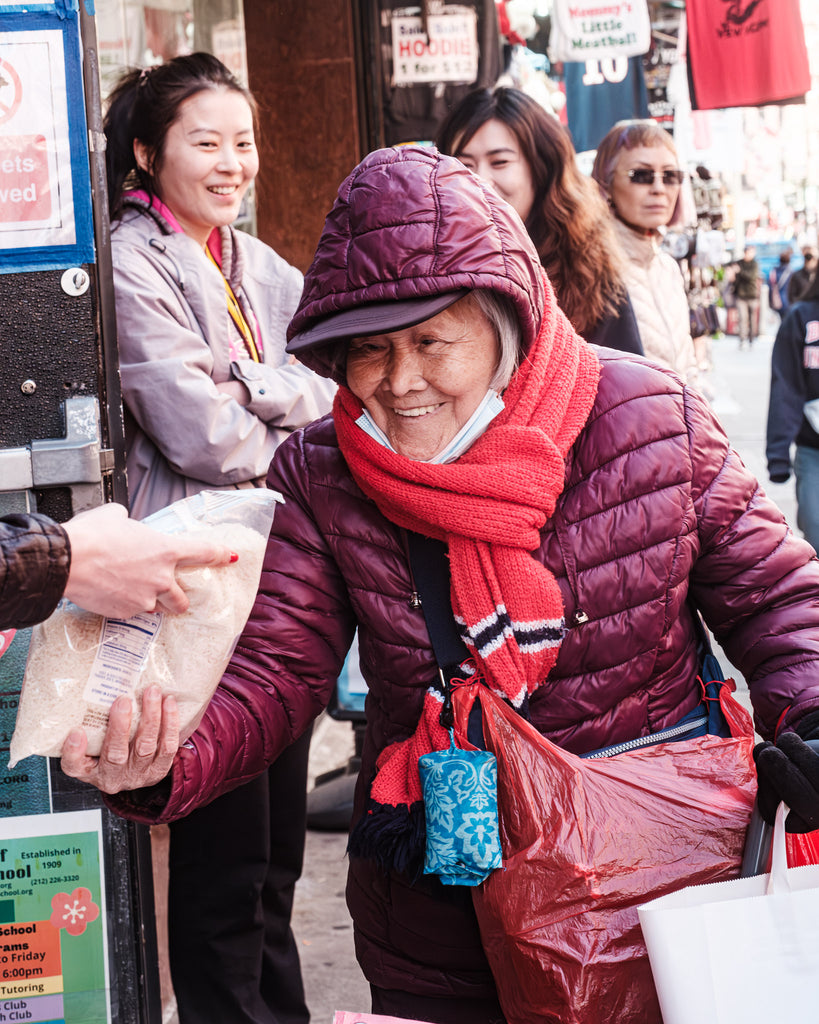
Initially, Meals for Unity started as a one-time event. Why was it important to continue distributing meals and form a nonprofit? How did you grow your team?
BRIAN: So through this whole experience, we initially were here to support because we knew so much hate was happening towards the API community. And we kind of unfolded that there's actually a bigger food insecurity problem within the API community. And that led us to really think about what is the mission of the organization and what do we want to do as Meals for Unity. And that was a big part of it. To me it was like, are we going to be here for two, three, or six months. We didn't know three years later, we'd be here. But it was always kind of a grassroots view on doing this. And even if we're just helping one more person, and it was only one more meal we could afford, we're making somewhat of a difference. So it was never really the picture that we'd be like, three years later, and looking to go towards the next step. But we just, you know, saw the stats that one in four Asian senior citizens in New York are food insecure, things like that we really wanted to do our part. So I think a year after doing this, we realized there were still a lot of people who were part of the community who really wanted to give back as well. So we saw a lot of interest from word of mouth and people volunteering at our events. And we realized we could build this organization to be long lasting. So we went from grassroots to how do we expand and scale and put in proper things so that we could last for the next five years. So one of the things we did was create a bigger team of departments. And we brought on an executive director, which is Priscilla here, who's been doing an amazing job putting together day to day operations and things that we could do to really set us up for the future.
PRISCILLA: Yeah, so I joined being the social media person and marketing director, because I have my background, expertise and professional world in that. So I was like let me come in and really amplify what you guys are doing on social because I really saw that that was the need, especially during COVID. It was like that's where you found out everything, about nonprofits, where to volunteer, and that's really where I actually found out about Meals for Unity.
And so I was doing that for about six months. And then they were looking for someone to take on a larger role. And it really just spoke to me and I think a really big part of Meals for Unity growing and why it continued is the creative community part. I feel like that was something that the Asian community hasn't really had. It really hasn't had the same movement that like Black Lives Matter has in that we just really never as a generation, were taught to stand up for ourselves, were taught to speak up. And so I think being part of a community that was really interesting to me to be like, Oh, we can speak up as Asian Americans. And our parents who are immigrants, are older. They don't know how to do that. So as a younger generation, we can really do that. That was like a big part of stepping into a larger role because I feel like not only do I want to make a bigger difference with my voice, but I think the entire organization and my friends were saying they want to get more involved.
Like Brian said, we were seven and now I think we're about 45 people who are all volunteer based that do this on top of their day to day work. But we have myself and then 10 directors under me. And then from there, they have their own teams that they manage. And you know that really came extremely organic. I would say there are people who volunteered with us since day one when they were getting up at 4am cooking the meals and they know Brian through that and that's how these friendships and bonds form. And then they would actually want to take on more responsibility as people stepped down and people wanted to shift their focus and step up into taking on more.
And then how we set our teams under everybody was honestly word of mouth. I think people come to our events and they enjoy the work that they do and that we do. It was like oh wow, this is fun to be part of this community. And I think we are always really blessed when people reach out and just want to join.
BRIAN: It’s been one of the bright spots and things that I did not foresee coming out of creating Meals for Unity is the amount of community that we've built within just the younger generation of Asians who want to do something more and give back. It's just been so overwhelming that it’s what keeps you going everyday. So it's been really exciting to see that happen.
It really is. I think the reason why so many organizations like yours and ours started during that time is because we started to see more spaces for Asian Americans where there wasn't a lot of before. And so a movement started, there was more empowerment for us to speak up. So it's such an exciting time. And it's exciting to see Meals for Unity grow to 45 people. It's amazing.
PRISCILLA: We love you guys. I still wear your WE ARE CHIMMI shirt all the time.
BRIAN: Yeah, it’s crazy because you’re like one of our first vendors.
PRISCILLA: That's also what really surprised us is not only is there a community of people who want to volunteer with us, and help our community, but we've just met so many amazing people who maybe they're not a nonprofit, but are doing things for the community, and raising awareness and creating awareness around this entire diaspora of people that people forget about sometimes. So seeing you guys as a success, and a lot of vendors pop up, and the fact that we can continue this partnership, so we are always very grateful for that. And that's something that, again, we always are like, wow, that's amazing that we can all be there for one another.
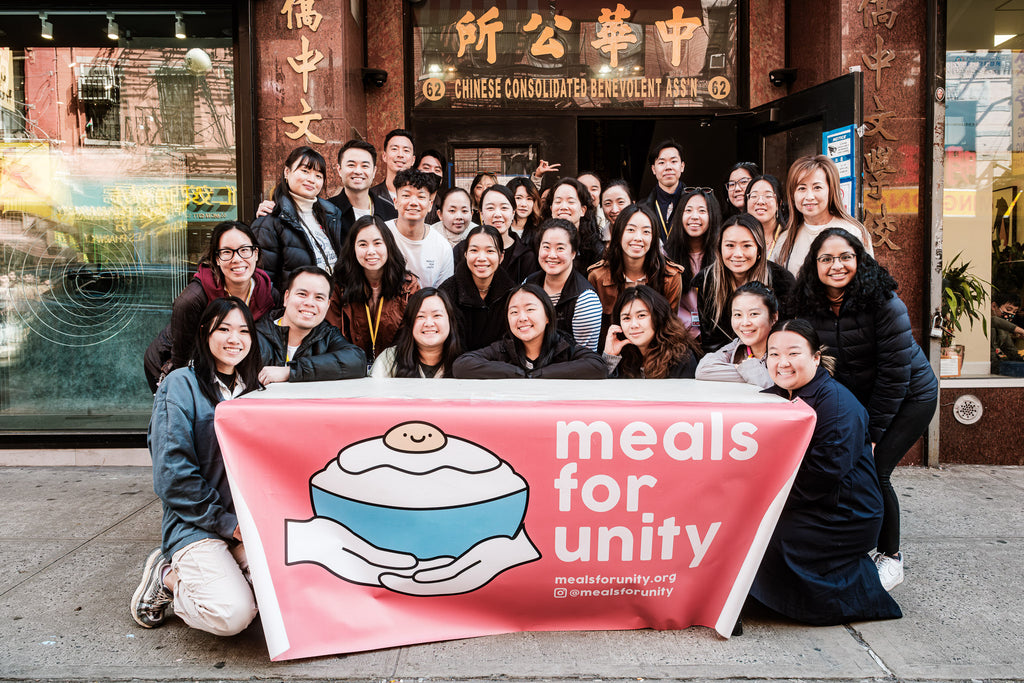 Meals for Unity team photo. Photo Credit: Geoffrey Chan @geo.eg
Meals for Unity team photo. Photo Credit: Geoffrey Chan @geo.eg
What is something most people don’t know about AAPI communities in the three boroughs that you serve in New York?
PRISCILLA: Yeah, it's such an interesting question. I will say, personally, I feel like I learned a lot during the pandemic of how big the Asian diaspora is, right? I grew up extremely, I would say, privileged and on Long Island, and I was really just kind of exposed to my community of Chinese Taiwanese friends. And so I think that something that really even surprised me, and I'm sure a lot of people don't know is that there is a large community of Asians in New York that aren't just Chinese and Korean or Japanese. There really is a community of Southeast Asians in the Bronx, and in Bayside, and Koreans. And I think that we just kind of forget that there are so many other people besides kind of what we see as the people named as the model minority. And so I think that's something that always surprised me and I think also why this organization existed because we didn't realize that there were people in need for food in our communities. So I think that's definitely something extremely interesting to learn. And I'm so blessed I learned that. And I learned recently that in New York, there's 35% Bhutanese people and 25%, Burmese Americans. So it's like, I don't think that a regular person, even myself knew that. So that's why it's so important that we just keep spreading the awareness about just how large the community really is, especially in New York.
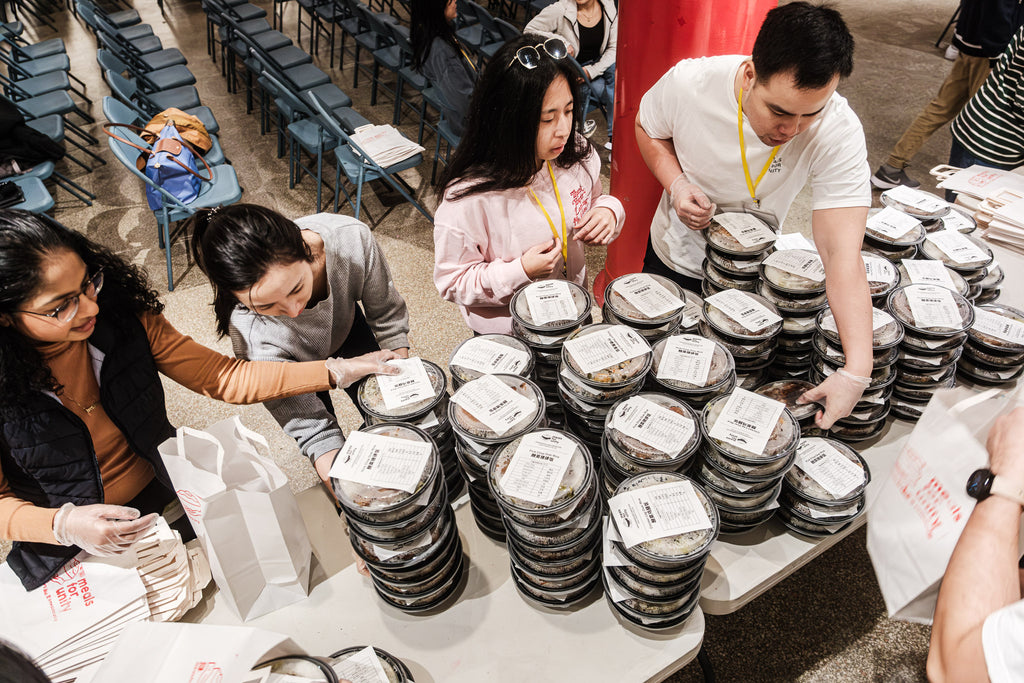
The Meals for Unity team preparing for a meal distribution. Photo Credit: Geoffrey Chan @geo.eg
Can you speak more about which boroughs you serve?
PRISCILLA: It’s Manhattan, Brooklyn, and Queens. And we've also done something in the Bronx. And I think that's actually kind of what is surprising people too, is that there are different Chinatowns. It's not just Manhattan, there is Sunset Park in Brooklyn, there is Flushing, Queens, and then in the Bronx, we worked with Southeast Asian organizations. So it's like there really are, you know, just so many pockets of us that we forget about or that we just don't know about. So I think that was one thing that being part of Meals for Unity and the communities we serve, we learned a lot of that, which has been really great.
And I think something interesting to note, too, is that with marginalized communities, it's also very common to be sharing cultures with other marginalized communities. There is a lot of Chino Latino restaurants, and there's a lot of historical ties with Chinese and Jewish communities. And so you start to see it more and more in the food we eat, and you'll start to see those crossovers and it's not always as clear when you're in just Manhattan Chinatown. But you definitely see it in the Bronx, where there's definitely more of a mix of communities. And it's really a vital part of New York that I don't think we even think about. Because as marginalized communities, we had to share our resources. And that's kind of how these cultures really melted together. And it's also the best part, I think of New York. And the best part of our community, is that we get to share with one another. And it's a big part of who we are, as a culture, food is so big. So the fact that we can share it and then spread it to other people is just a really cool part of New York.
Are there any plans to expand beyond those boroughs? Are there any future plans for Meals for Unity that you are able to share?
BRIAN: Yeah, I would say we're currently still trying to figure out what exactly we want to do as the organization as a whole, but we definitely want to keep expanding into these boroughs that we already have expanded to and try to create more consistent events and also find areas and different communities. Because at the end of the day, in the AAPI community, food and the act of sharing a meal really holds significance in our culture and we want to be really intentional with who we're expanding with, and the partners that we've worked with. So we're really looking for different communities, not just the Chinatown community in Manhattan, but really working to find those partners who we share the common mission that we can expand into places outside of these boroughs as well.
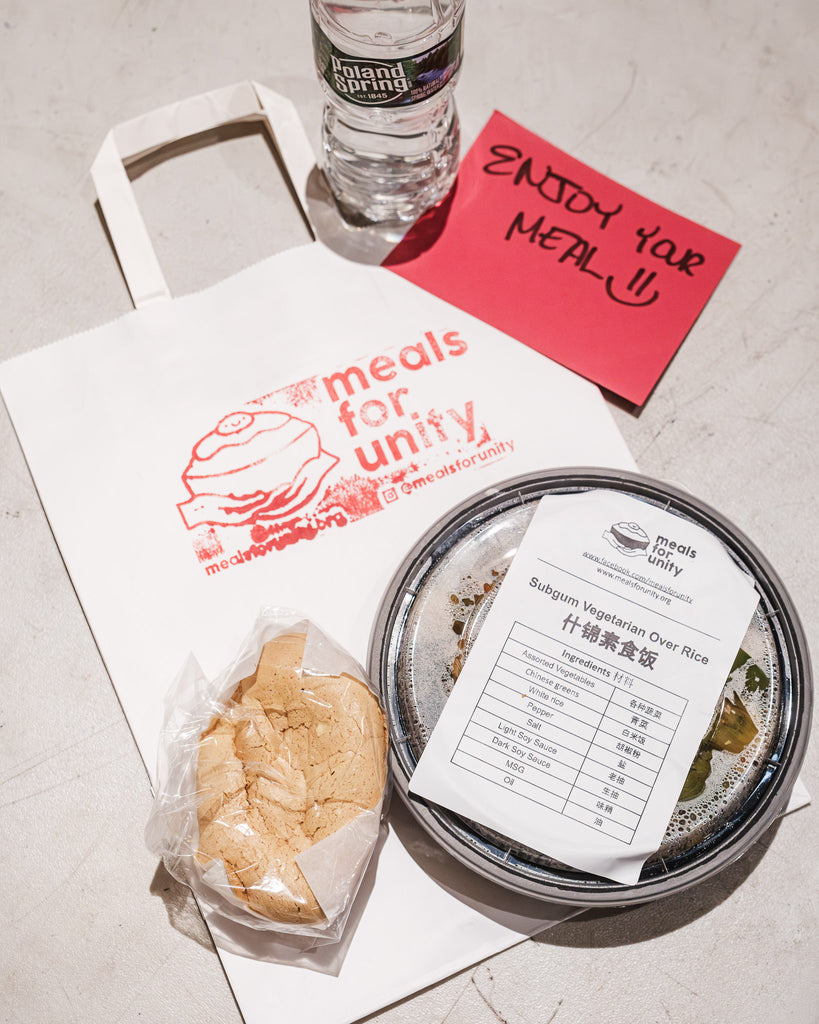
What’s the best way people get involved with Meals for Unity?
PRISCILLA: There are a lot of ways. So I would say first off from a volunteer standpoint, if you're interested in doing a meal distribution event with us, we do have a volunteer database that folks can sign up for right on our website, which is mealsforunity.org. And you'll be added right to our volunteer database. And our spots are first come first serve, but we do have that so you could definitely come volunteer at our very signature events, which is in Chinatown, usually, but again, we do have them in Brooklyn, the Bronx, and Queens as well.
And I think donating is always an option. So 100% of donations go towards our meal fund and our overhead costs. So that includes the meal, the dessert, any kind of bags we have, utensils, so all of that.
And then I think from a community standpoint, we are always doing events and fundraising events that are for our community and for young professionals to come and meet one another and fundraise for a good cause. So we have actually really exciting fundraisers coming up in May for AAPI Heritage Month so we have about I want to say three to four fundraisers lined up that folks can go to specific restaurants and support and buy a menu item where the proceeds will go to us. I think that's a really fun way to also interact and get to meet new people and meet the Meals team.
And from there I think one of the last things really is if you want to be a part of the team, definitely apply and talk to one of us because we're always looking for new team members to join.
BRIAN: Yeah, and then any kind of donation and partnership leads or anything like that is always helpful for our team, or any donors that people know that want to support a good cause is definitely one of the best ways they can help us out.
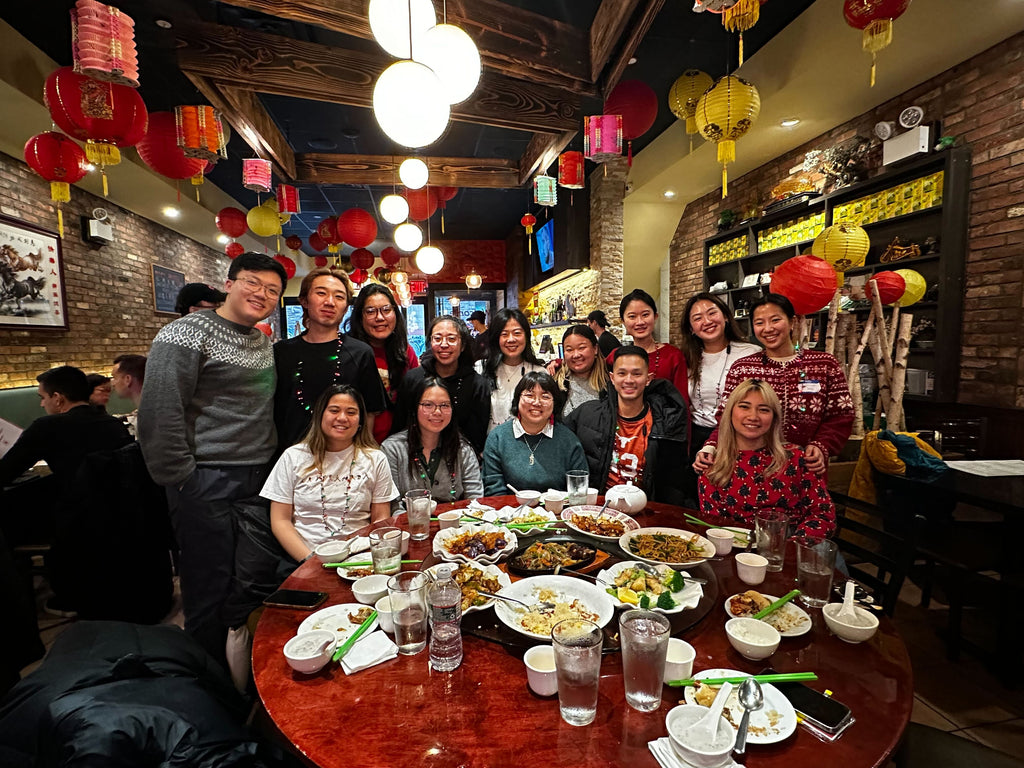 A Meals for Unity team social outing. Photo Credit: Meals for Unity
A Meals for Unity team social outing. Photo Credit: Meals for Unity
Learn more about Meals for Unity by visiting their website at mealsforunity.org and on their Instagram at @mealsforunity. Upcoming Meals for Unity fundraisers and events can also be found on their programs page.